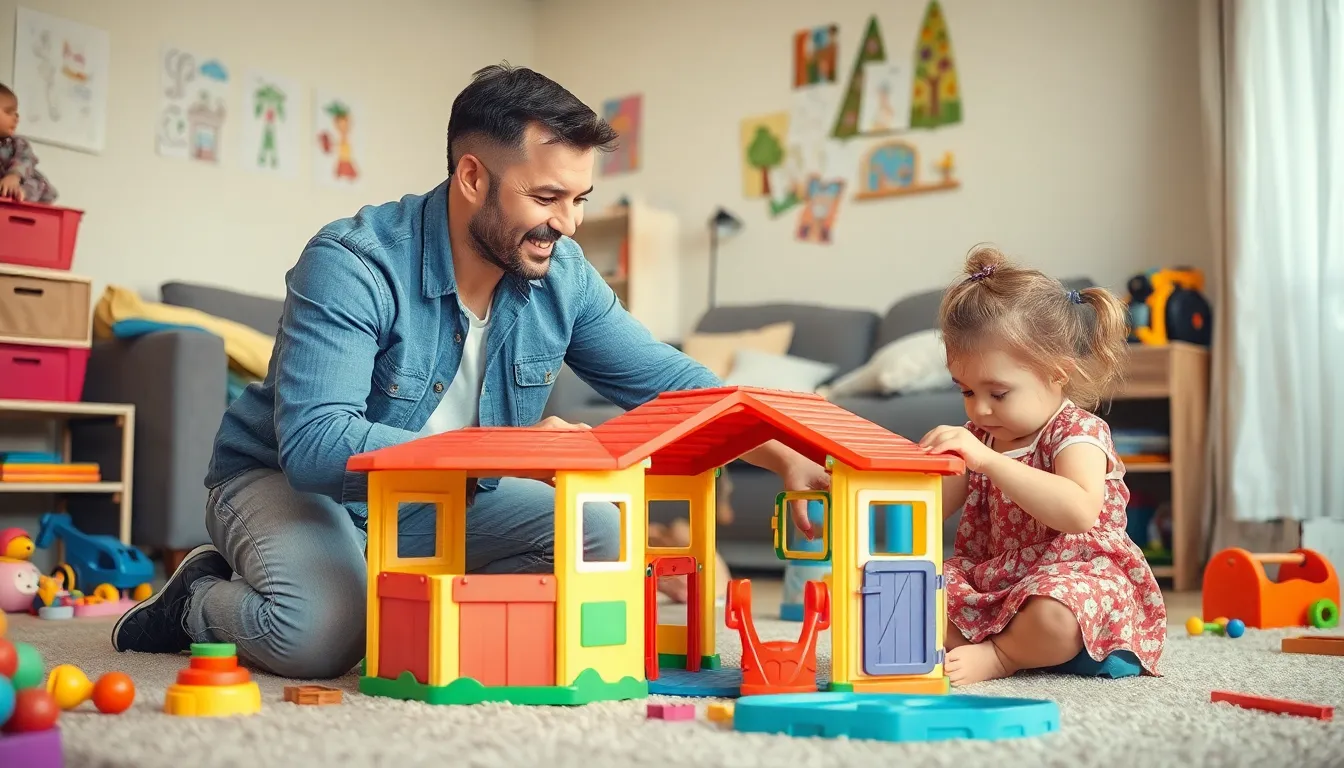Solo parenting can feel like juggling flaming swords while riding a unicycle. It’s challenging but also a chance to forge unbreakable bonds with kids. The unique journey of raising children alone offers moments that can turn chaos into cherished memories.
Building strong connections is key, and it doesn’t have to be all serious business. Embracing the fun side of parenting can transform everyday activities into opportunities for laughter and learning. Whether it’s turning chores into dance parties or storytelling that rivals the best Netflix dramas, there’s magic in the mundane.
In this article, we’ll explore practical tips and creative ideas to strengthen those vital connections. After all, solo parenting isn’t just about survival; it’s about thriving and creating lasting memories that’ll make you and your kids smile for years to come.
Table of Contents
ToggleUnderstanding Solo Parenting
Solo parenting presents unique challenges and rewards. This approach requires resilience, creativity, and dedication to foster meaningful relationships.
The Challenges of Solo Parenting
Solo parents face various obstacles. Time management becomes critical, as balancing work, household duties, and parenting can be overwhelming. Financial pressures add another layer of stress. Many solo parents experience feelings of isolation, often needing support and companionship. Emotional challenges emerge, too, with parents needing to provide stability while managing personal feelings. These complexities shape the solo parenting experience, demanding adaptability and resourcefulness.
The Importance of Building Bonds
Establishing strong connections with children is essential for solo parents. Close relationships boost children’s emotional well-being and foster security. Engaging in daily activities, such as reading or cooking together, strengthens these bonds. Open communication enhances trust and allows children to express their feelings freely. Taking time for fun, even in small moments, creates lasting memories and joyful experiences. Priority must be given to these connections as they lay a foundation for healthy development and positive interactions.
Strategies for Building Bonds

Building strong relationships with children involves consistent engagement and understanding. Solo parents can utilize various strategies that promote connection and emotional well-being.
Effective Communication Techniques
Active listening plays a vital role in effective communication. Consider asking open-ended questions to encourage children to express themselves. Acknowledging their feelings validates their experiences and fosters trust. Speak in clear language to ensure comprehension, especially with younger children. Tailoring conversations to their interests stimulates dialogue and maintains engagement. Regular check-ins create a routine, allowing children to feel secure and understood.
Quality Time Activities
Shared activities create memorable moments. Engaging in cooking together allows for creativity and cooperation, while simple errands can become adventures. Game nights introduce fun competition and laughter, strengthening bonds. Outdoor activities like biking or hiking promote physical health alongside relationship-building. Arts and crafts sessions foster creativity and self-expression. Prioritizing these activities makes a significant difference in nurturing connections and creating lasting relationships.
Emotional Connection with Your Child
Establishing a strong emotional connection with a child enhances their overall well-being. Strengthening this bond contributes to a nurturing environment where children feel secure and valued.
Nurturing Emotional Intelligence
Nurturing emotional intelligence in children involves recognizing and managing their feelings. Encouraging expression of emotions lays the foundation for strong self-awareness. Providing opportunities for children to explore their feelings through discussions and role-playing activities helps them understand themselves better. Engaging in diverse activities, such as storytelling or art projects, fosters emotional growth. Validation is key; acknowledging a child’s emotions promotes trust. Teaching empathy through examples equips children with essential social skills. These interactions not only build strong emotional connections but also fortify their resilience.
Understanding Your Child’s Needs
Understanding a child’s needs is crucial for enhancing their emotional connection. Observing behaviors and preferences sheds light on their unique personality. Communicating openly encourages children to share their thoughts, making them feel important. Consistently checking in on their feelings deepens this relationship. Asking specific questions about their day or interests opens up dialogue and strengthens trust. Creating a routine that incorporates shared activities offers a sense of stability. Recognizing non-verbal cues also plays a significant role in addressing needs. Prioritizing emotional awareness leads to stronger bonds and enhances overall well-being.
Building a Support System
Building a solid support system is essential for solo parents to thrive. Utilizing community resources can enrich their experience and alleviate feelings of isolation.
Finding Community Resources
Local community organizations provide valuable support tailored for solo parents. Many offer programs such as parenting classes, counseling services, and financial assistance. Libraries often host workshops and activities that focus on child development. Schools usually maintain resources, including support groups and extracurricular programs for kids. Churches and community centers frequently organize family events, fostering connection among attendees. Parents can explore online platforms like Meetup to discover groups that match their interests and needs.
Connecting with Other Solo Parents
Networking with other solo parents offers camaraderie and shared experiences. Online forums and social media groups create an easy way to connect with others facing similar challenges. Local meetups can lead to forming friendships and exchanging practical advice. Organizing playdates enables children to bond while giving parents a chance to socialize. Collaborating on childcare arrangements can lighten the load for everyone involved. Supportive chats with fellow solo parents contribute to building resilience and understanding through shared journeys.
Building strong bonds in solo parenting is a journey filled with both challenges and rewards. By focusing on consistent engagement and open communication, parents can create a nurturing environment that fosters emotional well-being. Incorporating fun activities into daily routines not only strengthens relationships but also cultivates lasting memories.
Establishing a solid support system is equally important. Connecting with other solo parents and utilizing community resources can alleviate feelings of isolation. Ultimately, thriving as a solo parent involves embracing creativity and resilience, ensuring that both parent and child flourish together.







